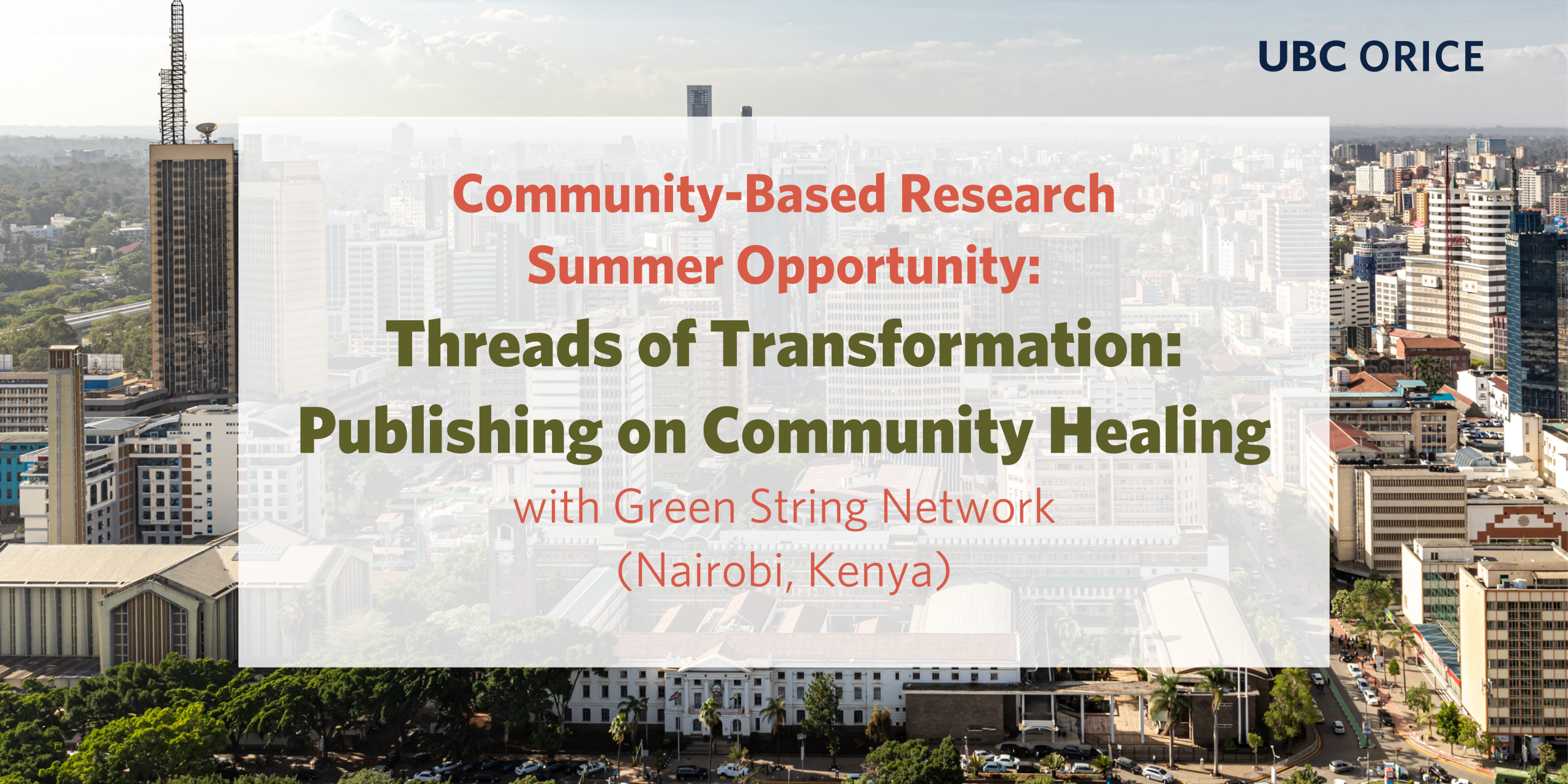
*This course is eligible for the Regional and International Service Learning Award. Please see below for more information on Funding Opportunities or check out our Funding page here.
Applications closed.
Program Overview
Eligibility Criteria
Open to all UBC students – upper-year undergraduate students or graduate students with solid writing and paper structuring skills preferred. Up to 2 placement spots are available.
Program Description
Green String Network (GSN) is a social movement that works with communities to heal social and collective traumas. They are a diverse team of peacebuilders, including psychologists, embodied practitioners, police officers, artists, storytellers, filmmakers, researchers, teachers, parents, young people, community leaders, and people with lived experience. Their mission is to design healing-centered interventions and develop innovative research methods to learn about the effectiveness of their work.
GSN’s focus is on addressing trauma as a root cause of violent behavior. To do this, they use storytelling, art, and embodied practices to help people articulate the traumas they have experienced and recognize how these experiences have shaped them. Through their programs, they aim to unlock new ways of thinking, behaving, and feeling, so that individuals and communities can live more full and peaceful lives. GSN believes that healing is the first and fundamental step toward building peace, well-being, and prosperity in the long term. They also examine peaceful behavior, particularly resistance to reactionary forces and ideas, to understand violent behavior more deeply. Their work focuses on preventing violence in a range of contexts, including violent extremism, violent crime, gender-based violence, and ethnic violence. By addressing trauma and promoting resilience, they believe that we can build a more peaceful world.
Over the years, GSN has collected an extensive amount of data around their programming, both qualitative and quantitative. To date, these data have been used largely to inform reports for donors and for internal evaluation purposes. Moving forward, GSN is interested in using the data they have to focus on specific programming outcomes to publish in academic journals around the effectiveness of their work, to share and engage with a wider audience. In particular, GSN are looking at the outcomes from one specific program and are seeking to publish around how participants’ increased awareness of trauma has impacted mental health outcomes: feelings of agency and self-confidence, indicators around post-traumatic stress, their future and those of the next generation, among others. Much of the framing around these indicators already exists in report form and students will work alongside GSN’s team to transform this into a publishable academic paper. However, students should expect to return to raw data for additional analysis depending on the focus and scope of the paper. Students may also work with GSN to further outline their core publication priorities from the data they have.
Students will be placed in Kenya with GSN to gain a contextual understanding of the organization’s work and to observe their initiatives and programming – this will inform the academic publishing work. Students in this placement should be prepared to take initiative while working closely with the GSN team, understanding their core focus is to provide their peace-building programming in the community. However, a key focus of their strategic planning for the future is around formalizing their existing research and data in the form of academically publishable work, which is where student focus will be placed.
This placement is best suited for students in the 3rd or 4th year of their undergraduate programs, or graduate students, who have solid writing skills and, preferably, some experience with working towards academically publishable products. Students should also exhibit some interest in thinking about the role of academic publishing in program legitimacy, and in the work of GSN through a meaningful connection to peace-building, mental health outcomes, and anti-violence programming generally. The program is open to students from all faculties.
Program Key Dates
February 28th – March 10th – Applications are accepted until 11:59 pm on Sunday, March 10th OR until full
March-April – Orientation and pre-departure learning sessions (all successful applicants will be expected to attend all sessions).
May / June – 8 weeks of fieldwork in an international immersive placement in Kenya
TBD – Re-entry debrief
Pre-Departure Overview
The pre-departure learning program is designed to prepare you for an international placement. This will include:
- Pre-departure learning sessions taking place over the academic term leading up to departure led by staff and community development professionals;
- Creation of a learning and development plan;
- Participant-led events/presentations;
- Facilitated meetings with your placement team to explore learning topics;
- Post-placement activities.
Post-Placement Overview
You will participate in post-placement activities including:
- Debrief session in July 2024; and
- Public engagement presentation related to placement research in October 2024.
Program Fees
Program Fee: $3,900 – $4,400*
*Note: Program fees may be adjusted before the offer. Program costs vary primarily due to cost of living expenses and will be communicated if an adjustment is required.
Program fee includes:
- Pre-departure learning sessions at UBC
- Room and board
- Transportation from the airport to your placement site
- Orientation in the host country
- In-session debrief and workshop part way through your placement
- Reflection materials
- Community partner management fee
- Program management fee
Note: Additional expenses not covered in program costs are the responsibility of the student. Costs not included are airfare, visas, vaccinations, tuition, local transportation while in the country, transportation from the site back to the airport at the end of the placement, personal items, and daily incidentals.
Awards and Funding
Funding available for this program: Regional and International Service Learning Award.
Note: Students may only hold one award at a given time. Please visit the Funding page below for more information on the awards.
How To Apply
For more information about the program and the course, please contact ORICE at ubc.orice@ubc.ca